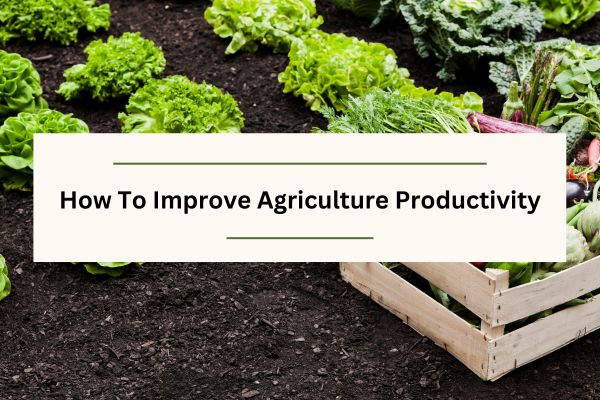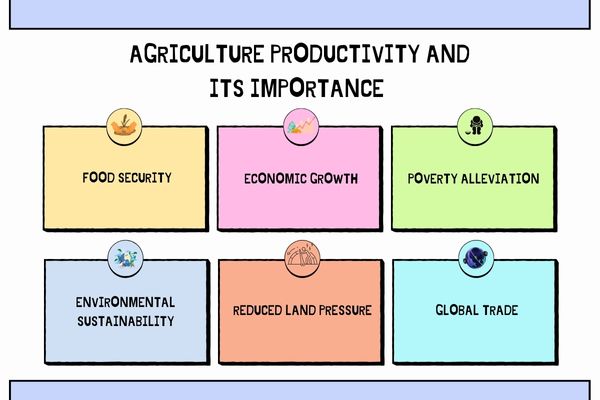How To Improve Agriculture Productivity – Top 5 Tips

Agriculture output in an area is important for several reasons. In addition to enhancing food production, higher farm productivity affects the region’s prospects for expansion and competitiveness on the agricultural market, income distribution and savings, and labour migration.
Agriculture Productivity may be measured in a variety of ways. The agricultural output may be used to assess the production systems of a single farm, a cooperative of several farms, a region, a country, or even the entire planet. The proportion of agriculture exports to imports serves as a national indication of the development in agricultural production.
Farmers are more lucrative and competitive as a result of the capacity to produce more output with less inputs. By taking steps like deforestation, it is possible to reduce the amount of land needed for cultivation while also reversing environmental damage and climate change.

Agriculture Productivity and Its Importance
High agricultural productivity is essential for food security and economic prosperity for a number of reasons. The need for food is rising as the world’s population continues to expand. High agricultural productivity guarantees that enough food is produced to continuously fulfil this demand, lowering the possibility of food shortages and famines.
The excess supply of food on the market as a consequence of high agricultural production keeps food prices stable. For consumers, particularly low-income households, price stability is essential since shifting food costs can cause problems with affordability.
Rural development can be boosted by a robust agricultural industry. The construction of rural infrastructure, such as roads, schools, and healthcare facilities, can encourage the use of modern farming techniques, technologies, and inputs, enhancing the general standard of living in rural regions.

A large portion of the worldwide labour force is employed in agriculture. More jobs in the agricultural sector and allied businesses, such as food processing and transportation, can result from increased agricultural output, which lowers unemployment and poverty rates.
National security depends on the availability of food. High agricultural productivity assures a reliable and inexpensive domestic food supply, decreasing vulnerability to global supply interruptions and price variations. This reduces dependency on food imports.
Prioritising environmental sustainability is crucial while aiming for high agricultural output. While guaranteeing long-term food security, sustainable agricultural practises can reduce the negative environmental effects of farming, such as soil erosion and water pollution.
Agriculture Productivity-Influencing Factors

- Climate
Due to drought, heat waves, flooding, an increase in pests and plant diseases, and decreased food yields and nutritional quality, climate change’s effects on agriculture may reduce agricultural yields. Impacts of climate change make it more difficult for agriculture to provide for human needs.
- Soil Quality
Water, air, and root support are all impacted by soil structure in the growth of food and fibre.Large amounts of organic matter, nutrients, and water can be found in high-quality soils.Farming practises have an impact on the quality of the soil. As soil is turned over for planting, ploughing and tilling can disturb the structure of the soil.The cycling of nutrients into forms that plants can use depends on the quality of the soil.
- Technology and Farm Machinery
Modern agricultural machinery and technologies increase productivity while reducing the demand for physical labour.
- Seed Quality and Varieties
Using a variety of cultivars and premium seeds boosts crop yields and a crop’s resistance to environmental stresses.
- Fertilisers and Nutrient Management
Appropriate fertilisation and nutrient management produce improved crop yield and optimal soil health.
- Pest and Disease Management
Adoption of efficient pest and disease control strategies is necessary to protect crops and maintain production potential.
- Irrigation and Water Management
By using effective irrigation and water management techniques, enough crop moisture and reduced water waste are assured.
The Best 5 Methods For Enhancing Agricultural Productivity

- Sustainable Farming Methods
A sustainable food system avoids the use of chemicals, conserves energy and water, prioritises local production, reduces inputs and makes better use of resources locally, appreciates biodiversity and ecology, and operates within the global resource constraints we face.
Alternatives to traditional input-intensive agriculture, whose long-term effects include deteriorating topsoil, dropping groundwater levels, and diminished biodiversity, are greatly needed. In a world with limited climate change, it is essential to guarantee India’s food security.
Sustainable agricultural practices improve our quality of life while having a good impact on the environment.Using fewer pesticides in farming practices can help increase social equity and public health.
- Management of nutrients and soil health
The efficient management of soil nutrients and health is crucial for increasing agricultural output. To best use these important aspects, farmers use a variety of techniques. These include techniques for precision agriculture that ensure crops receive the required nutrients in the right amounts, such as soil testing and careful fertiliser delivery.
Crop rotation, cover crops, and the integration of organic materials are examples of sustainable farming techniques that assist maintain soil fertility and structure. Increasing agricultural output sustainably while minimising environmental consequences requires a holistic approach that combines nutrient management, sustainable practices, and technology.
- High-Quality Seed Stock
According to agricultural experts, high-quality seed from improved varieties is regarded as the essential component for boosting agriculture productivity and achieving food self-sufficiency. When using high-quality seeds, other inputs like fertiliser, herbicides, and irrigation can be more effective.
- Water Management
A key factor in increasing agricultural output is efficient water management, particularly the use of water softener for agriculture. By breaking the crystallised chunks of calcium and magnesium in hard water used for irrigation, these water softeners prevent the production of harmful soil salts that obstruct plant growth.
Softened water promotes greater nutrient uptake by crops, improves soil permeability, and lessens compaction. Additionally, it maintains the appropriate pH of the soil, promoting a favourable environment for plant roots.
Water softeners provide higher crop yields, improved soil vitality, and sustainable agricultural practices, ultimately leading to an overall increase in agricultural production through the control of water quality and the prevention of soil degradation.
- Disease and Pest Management
The control of diseases and pests effectively is essential to increasing agricultural output. To reduce the damage caused by pests while protecting beneficial creatures, integrated pest management (IPM) combines several strategies such as crop rotation, biological control, and sensible chemical application. Extensive outbreaks can be reduced by early illness detection using regular surveillance and cutting-edge diagnostics.
A key factor in reducing dependency on chemical therapies is genetically modifying crops to have resistance and tolerance traits. Agriculture Productivity is also increased by promoting farmer education and understanding of sustainable practices. It is essential to have a comprehensive strategy that balances economic, environmental, and social factors in order to maintain agricultural output while minimising negative effects.
Government initiatives and support
There are 29 centrally sponsored government programmes designed to support agriculture and raise farmers’ incomes nationwide. The list below includes some significant government programmes for the agricultural industry. The Soil Health Card Programme was introduced in 2015.
National Food Security Mission (NFSM)
The National Food Security Mission (NFSM) intends to boost the production of rice, wheat, pulses, and coarse cereals through area extension and productivity enhancement, soil fertility restoration, employment creation, and farm-level economic enhancement. The mission’s primary aim is to spread new technologies, such as seed, micronutrients, soil amendments, integrated pest control, agricultural equipment, and resource conservation technologies, while also enhancing farmer capacity.
Conclusion:
Agriculture production is essential for both food security and economic success because it guarantees that there is enough food produced to fulfil the demand of the expanding world population, lowering the likelihood of food shortages and famines. High agricultural production also helps to keep food prices stable, which is important for consumers, particularly low-income households, as fluctuating food prices can be difficult to pay.
A number of factors affect agricultural production, including climate change, soil quality, technology, seed quality, fertilisers and nutrient management, pest and disease control, irrigation and water management, and high-quality seed stock. As a result of drought, heat waves, flooding, pests, and plant diseases, climate change can lower agricultural productivity. Farming practices have an impact on soil quality, and effective fertilisation and nutrient management can increase crop output and soil health.



